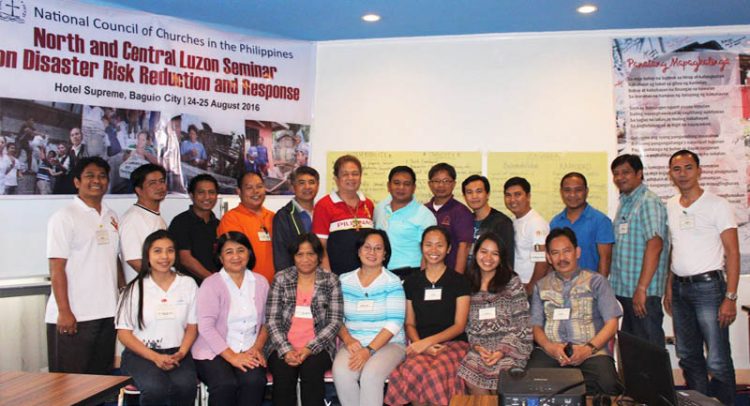Church leaders and representatives from NCCP member churches and Regional Ecumenical Councils in Northern and Central Luzon gathered in Baguio City for a two-day seminar for Disaster Risk Reduction and Response last August 24 to 25, 2016.
“This inter-regional unity consultation and workshop aimed to establish a common ground for the churches to unite on their distinct role in community-based humanitarian response,” said Minnie Anne Calub, the Emergency Program Manager of NCCP.
Through a biblico-theological reflection, Fr. David Tabo-oy from Episcopal Church of the Philippines reminded the delegates of their Christian role in humanitarian response.
“We are to be the salt and light of the world (Matthew 5:13-16), giving people hope against death, deterioration, and oppression. Every church, at its core, has a faith-driven ministry that is highly conscious and compassionate to the needs of the hungry, thirsty, and vulnerable,” said Fr. Tabo-oy.
The delegates arrived at a common understanding on the vulnerability of the Philippines – particularly the North and Central Luzon regions – to disasters.
“They realized the vital role of the church in the localization of humanitarian and emergency response. Moreover, they also saw their place in the global and national humanitarian system, and the opportunities and challenges laid out for them,” said Ms. Calub.
“With this, they recognized that humanitarian work sees no barriers between the race, gender, religious belief, class or political opinions especially in the time of emergencies. Thus they recognized that humanitarian work becomes a task for the churches as much as it is for the State,” she added.
The participants also identified ways they could work together as an ecumenical body in their respective regions, identifying their churches’ individual strengths and gaps as well as concrete action plans in response to the vulnerable situations of their regions.
“The delegates recognize this inter-regional coordination to be a platform of ecumenical fellowship among churches that will lead to meeting the challenges of disaster risk reduction and management” Ms. Calub ended.

